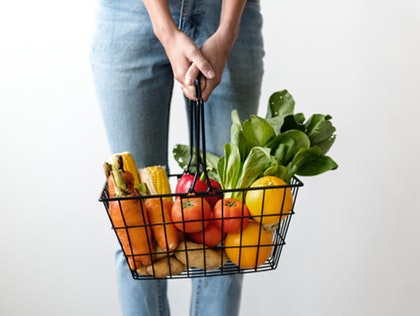Some people have concerns if a vegan diet is a safe option for pregnant women to meet the required nutritional needs. In this article, we explore different facts related to vegan food in pregnancy.
Good nutrition is key to good health and wellbeing during pregnancy.
A vegan diet is a type of vegetarian diet which does not include meat, fish, eggs and dairy products, and any food/ food-product derived from an animal. In a broader perspective, veganism is a philosophy and way of life to exclude the use of any animal-derived products for food or any other purpose.
As the diet is entirely plant-based, there are legitimate concerns if the vegan diet can provide some of the necessary nutrients which are found more abundantly in food from animal origin. These include both macro- and micro-nutrients as follows
PROTEIN
Many believe that plant-based foods do not contain good quantity and quality of protein. However, this is not true. A well-planned vegan diet can provide similar nutrients as healthy meat-based or other non-vegetarian diets. (1)
This includes the necessary essential amino acids required for good health.
Regardless of the type of diet (vegetarian or non-vegetarian), it is recommended that women during pregnancy and breastfeeding should take an extra 25g protein every day.
A variety of fruits, vegetables and other plant products can meet the additional nutritional requirements of pregnancy and beyond.
Omega-3 (‘n-3’) Fatty Acids:
There are three types of omega-3 fatty acids: ALA (alpha-linolenic acid), EPA (eicosapentaenoic acid) and DHA (docosahexaenoic acid).
The challenge in vegan food:
Among all three omega-3 fatty acids, only ALA is primarily present in plant-based sources. It can be found in flaxseeds, chia seeds, hemp seeds, walnuts and also the oils derived from these seeds and soybean oil.
There is extremely limited availability of EPA and DHA from the plant sources. Certain seaweeds are known to contain the.
ALA is converted to EPA and DHA in the body. For the vegans, the body primarily relies on this conversion for the adequate supply of EPA and DHA.
However, the ALA conversion can be disrupted by several factors, such as:
– Diets rich in Linoleic Acid (Omega-6 fatty acids): this can reduce the conversion by 40-50%
– Inadequate intake or deficiency of protein, vitamins (such as pyridoxine), calcium, magnesium and zinc.
– Intake of excessive saturated fats and trans fatty acids
– Alcohol
– Genetic factors
Some suggestions to ensure adequate n-3 fatty acid intake:
1. Ensure food rich in ALA
2. Ensure better conversion of ALA to EPA and DHA:
– Reduce excessive omega-6 intake: such as corn, sesame, grapeseed and sunflower oil
– Reduce saturated fats such as hydrogenated vegetable oils
3. May consider food with a direct source of APA and DHA, such as some seaweeds and microalgae (eg Spirulina). However, sea vegetables may contain excessive iodine.
4. May consider fortified food or supplements.
Vitamin-B12
The main source of Vitamin-B12 is the foods from animal origin. Therefore, it is recommended that pregnant or lactating women should be encouraged consider adding vitamin B12 fortified food or supplements, to their diet.
Fortified food may include breakfast cereals (always advisable to take low sugar products), unsweetened soya drinks, and yeast extracts (e.g., Marmite).
Further reading from The Vegan Society website.

Iron
Many plant foods are rich in iron. The iron present in the plant food is called ‘non-haem’ iron (iron from the animal sources are called ‘haem iron’).
There are some substances such as phytates (present in cereals and pulses) or tannins (tea and coffee) and fibre in plant food and food-products can reduce the non-haem iron absorption.
It is important to remember that vitamin C in the diet increases iron absorption.
Therefore, careful vegan meal planning can prevent iron-deficiency during pregnancy and breastfeeding.
Some suggestions include:
1. Ensure iron-rich food in the diet such as lentils, beans, chickpeas, chia seeds, hemp seeds, ground linseed, pumpkin seeds, tofu, cashew nuts, kale, dark green vegetables, quinoa, dried fruits (such as apricot, raisins and figs).
2. Fortified food, such as breakfast cereals and bread with added iron.
3. Consider adding food rich in Vitamin C to the diet. Examples include vegetables (such as tomatoes, broccoli, pepper, cabbage, Brussel sprouts), fruits (strawberries, oranges, kiwi fruits, pineapple) and fruit juices (such as orange juice).
4. Consider cooking in cast iron pans.
5. Lowering the phytic acid content in the food, such as soaking cereals and pulses grains before cooking or using the ‘sour-dough’ method in preparing bread.
6. Avoid tea and coffee immediately after a meal.
7. Iron supplementation as advised by healthcare professionals or national guidelines.
CALCIUM
Many plant foods are a good source of calcium. However, oxalates and phytates present (but not the fibres) in the vegetables could reduce calcium absorption in the small intestines. It is also interesting to note that the calcium present in fortified food is well absorbed.
Some suggestions to improve calcium intake:
1. Ensure to include vegetables low in the phytate and oxalate contents (such as kale), brown and white bread, sesame seeds and tahini, dried fruits.
2. Fortified food such as rice, oat drinks and unsweetened soya and Calcium-set tofu, linseed bread with extra calcium.
3. Calcium supplementation as advised by your healthcare professional.
Vitamin D
Vitamin D is synthesised in our skin on exposure to the sunlight. Vitamin D levels in our system vary in different seasons of the month with the lowest levels seen during the winter months. With regards to food, Vitamin D is primarily found in dairy products and not in plant foods. Therefore, it is challenging to meet the daily nutritional requirements of vitamin D from vegan food alone.
Fortification of plant food with vitamin D is rare. Therefore, one should not rely on fortified food alone.
Some breakfast cereals and fat spreads are often fortified with vitamin D.
However, the labels of the products should be checked to ensure that vitamin D is from a plant source.
NHS advices women during pregnancy and breastfeeding to consider taking a 10 microgram of Vitamin D supplement every day (especially during winter months).
However, product label should be checked that the vitamin D in the supplement is not of animal origin. Supplements containing Vitamin D3 from lichen and Vitamin D2 are suitable for the vegans.
Zinc
There are many plant foods rich in zinc (such as cereals, pulses, whole grain, nuts and seeds). However, calcium absorption in the intestines is reduced by some substances (such as phytates, oxalates, and some fibres) present in these foods. They act as a ‘chelating agent’ preventing the absorption of zinc in the small intestines.
Some other suggestions to improve zinc intake are:
1. Due to the presence of these inhibitors, it is usually recommended that vegetarians should take 50% more zinc-rich food compared to non-vegetarians.
2. Consider other food preparation methods to reduce phytate content (such as soaking and germination, ‘sour-dough’ method of bread preparation)
3. Zinc fortified food, such as breakfast cereals.
4. Consuming food rich in zinc along with fruits (organic acids present in the fruits increase zinc absorption)
Recommended reading
1. Position of the Academy of Nutrition and Dietetics: Vegetarian Diets
2. Position paper on vegetarian diets from the working group of the Italian Society of Human Nutrition.
Reference
1. Institute of Medicine. Dietary reference intakes for energy, carbohydrate, fiber, fat, fatty acids, cholesterol, protein, and amino acids.

